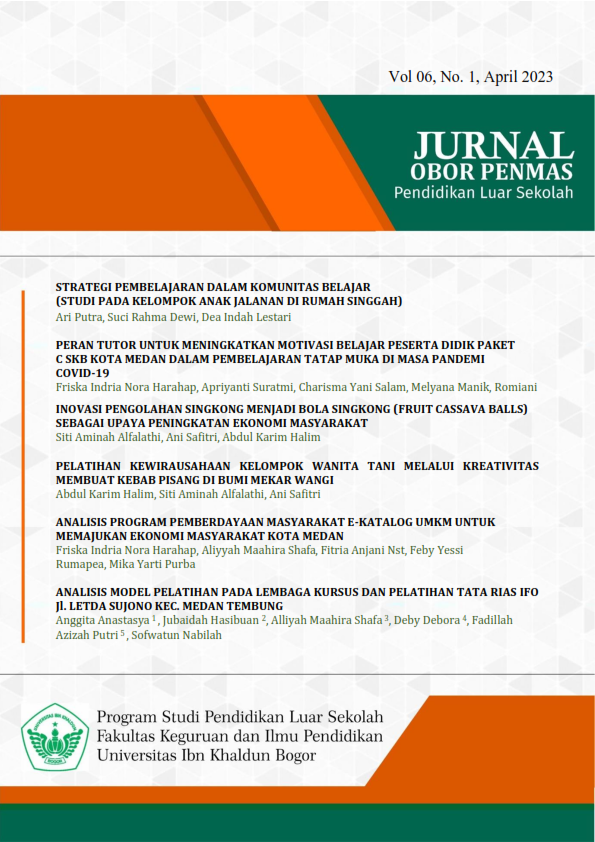ANALISIS MODEL PELATIHAN PADA LEMBAGA KURSUS DAN PELATIHAN TATA RIAS IFO Jl. LETDA SUJONO KEC. MEDAN TEMBUNG
DOI:
https://doi.org/10.32832/oborpenmas.v6i1.13807Abstrak
This study aims to determine the training model used at the IFO Makeup Course and Training Institute, Jalan Letda Sujono, Kec. Medan Tembung, North Sumatra, Indonesia. By using a qualitative approach, descriptive methods and data collection techniques include observation, interviews, documentation studies. Based on the results of observations regarding the Training Models and Models used at the IFO Makeup Course and Training Institute, Jalan Letda Sujono, Kec. Medan Tembung, North Sumatra, Indonesia. There are 3 Training Models namely Deductive, Inductive and Classical Models. And after we observed the training model conducted at the IFO Special Institute and Cosmetology Training was a Deductive model because the training at IFO focused on determining training needs, they selected participants with the same characteristics and submitted considerations to all participants. Identification results are used in compiling comprehensive training materials. The results of this identification are very useful because from these results the LKP IFO can make/compile training materials that are comprehensive and not just partial. During the training at LKP IFO, to be precise, the cosmetology training, they had 2 instructors and 1 expert recruited from outside.
Referensi
Gronlund, N.E. & Linn, R.L. (1990). Measurement and evaluation in teaching. (6thed.). New York: Macmillan.
Effendi, S. (1982). Unsur-unsur penelitian ilmiah. Dalam Masri Singarimbun (Ed.). Metode penelitian survei. Jakarta: LP3ES.
Daniel, W.W. (1980). Statistika nonparametrik terapan. (Terjemahan Tri Kuntjoro). Jakarta : Gramedia.
Suyanto, S (2009). Keberhasilan sekolah dalam ujian nasional ditinjau dari organisasi belajar. Disertasi, tidak dipublikasikan. Universitas Negeri Jakarta.
Pritchard, P.E. (1992). Studies on the bread-improving mechanism of fungal alpha-amylase. Journal of Biological Education, 26 (1), 14-17.
Retnawati, H. (2014). Teori respon butir dan penerapannya. Yogyakarta: Nuha Medika.
Hasdiansyah, A., & Suryono, Y. (2016). evaluasi program pelatihan pemuda dalam meningkatkan SDM di HMI koordinator komisariat UNM. Jurnal Pendidikan dan Pemberdayaan Masyarakat, 3(1), 1-15. doi:http://dx.doi.org/10.21831/jppm.v3i1.8062
Herwina Wiwin. (2021). ANALISIS MODEL-MODEL PELATIHAN, Madiun : CV. Bayfa Cendekia Indonesia
Yulastri Asmar. (2020) . Model Pelatihan
Wirausaha, Bandung : Penerbit Alfabeta Bandung
Laird, Dugan. (1985). Approaches To Training and Development. Second



















